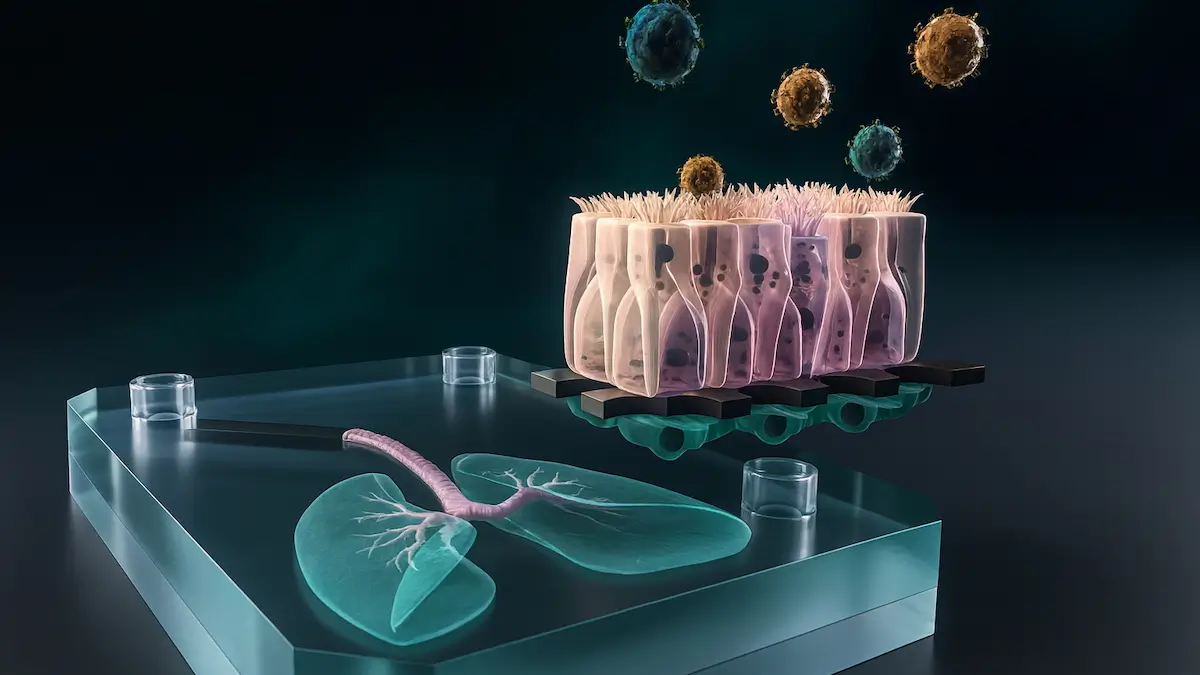The contribution lungs on computer chip: How a technology is supposed to prevent pandemies first appeared at the online magazine Basic Thinking. You can start the day well every morning via our newsletter update.

Researchers from Japan have developed an artificial “lung on a chip” that is intended to realistically reproduce different regions of the human organ. The aim is to carry a provision against possible pandemics and to combat respiratory diseases.
Respiratory diseases such as Covid-19 or influenza have demanded millions of lives in the past decades and revealed weaknesses in medical research. Because the human breathing system is complex.
Infections have a different effect depending on the lung region. So far, it was hardly possible to explore these differences precisely. Even animal models or simple cell cultures reached their limits. A Cyoto University research team Would like to change that with a new approach: a “lung on a chip”.
To this end, the scientists developed a so -called microphysiological system (MPS) that depicts both the upper respiratory tract and the lung bubbles (alveoli). The special thing is that the chip is based on individual stem cells, so-called IPS cells. These can be developed from body cells and then converted specifically into different lung cells.
Lungs on computer chip: What happens in the body – and when?
The same cells can be distributed on two chips with the new technology and exposed to various viruses-for example the Coronavirus Sars-Cov-2 and the influenza virus. The reactions to the infections show understandable differences.
The researchers, for example, found that at Sars-Cov-2 the upper respiratory tract triggered an early and strong immune response, while the deeper alveoli reacted delayed delayed. This could explain why Corona causes serious pneumonia and long -term damage in some cases.
In contrast, influenza triggered a stronger and simultaneous immune response on both chip regions. However, more cell damage also occurred in the result. These findings show that not all viruses attack the lungs, which can be decisive for the development of targeted therapies.
A small chip with large perspectives
The “lungs on a chip” is more than a smart replacement for animal experiments. It allows tailor -made insights into the course of the disease, accelerates medication tests and could help react faster in future pandemics.
The system is still a research prototype, but the scientists are already planning to expand to other organs-and even multi-organ chips. All of this may sound like science fiction, but could soon make a decisive difference.
Also interesting:
- This AI analyzes materials – and makes buildings cooler
- Lithium of sea water – how a new membrane should help
- How Ki makes moods visible in real time
- A mini organ in the laboratory: liver tested on the chip
The contribution lungs on computer chip: How a technology is supposed to prevent pandemies first appeared on basic thinking. Follow us too Google News and Flipboard Or subscribe to our update newsletter.
As a tech industry expert, I am incredibly excited about the potential of lungs on computer chip technology in preventing pandemics. This innovative technology has the ability to mimic the structure and function of human lungs, allowing researchers to study how respiratory viruses and diseases spread and impact the body in a controlled environment.
By using lungs on computer chip technology, scientists can gain valuable insights into how pathogens like influenza or COVID-19 interact with lung cells and develop targeted treatments and vaccines to combat these diseases. This technology has the potential to revolutionize the way we understand and respond to respiratory illnesses, ultimately helping to prevent future pandemics.
Additionally, lungs on computer chip technology could also be used to test the efficacy and safety of new drugs and therapies, speeding up the drug development process and potentially saving countless lives in the process. Overall, the possibilities for this technology in preventing pandemics are truly groundbreaking and I am excited to see how it continues to evolve and make a positive impact on global health.
Credits